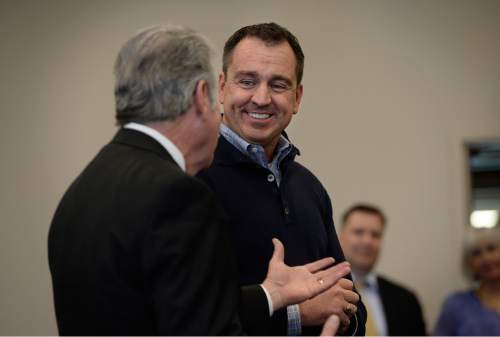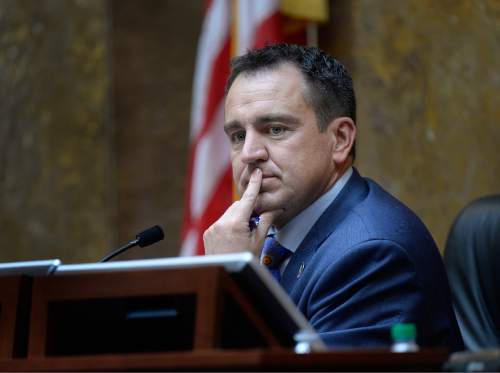This is an archived article that was published on sltrib.com in 2015, and information in the article may be outdated. It is provided only for personal research purposes and may not be reprinted.
A lawsuit filed Tuesday claims that a Utah law is so vague that it could force groups such as the LDS Church, Planned Parenthood and the Utah Taxpayers Association to disclose all their donors if they speak out on political issues.
Three nonprofits — the Utah Taxpayers Association, Utah Taxpayers Legal Foundation and Libertas Institute — filed suit in U.S. District Court challenging HB43, which was passed in 2013 and sponsored by House Speaker Greg Hughes, R-Draper.
It grew out of scandals involving former Utah Attorney General John Swallow.
House investigators said Swallow funneled hundreds of thousands of dollars in donations from payday lenders through a nonprofit, among others, to hide donors' identity. Money was used to help Swallow in his race against Sean Reyes, and to help defeat state Rep. Brad Daw, R-Orem, who pushed bills that payday lenders disliked.
Hughes said he wanted to close loopholes that allowed donors to remain secret. But the nonprofits say in their lawsuit that the bill was written too vaguely.
Attorneys said the law requires any nonprofit group to disclose its donors if it spends $750 or more "to influence or tend to influence, directly or indirectly" any campaign or vote.
"But that can be almost any speech, especially in a free society where ideas are expected to influence our government," said Allen Dickerson, legal director for the Virginia-based Center for Competitive Politics — which is representing the local nonprofits.
For example, Connor Boyack, director of Libertas Institute — which says it "promotes the cause of liberty" — said his group chose not to comment much on Proposition 1 that sought to raise sales taxes for transportation because HB43 might have forced it to reveal all its donors.
Billy Hesterman, vice president of the Utah Taxpayers Association, said HB43 similarly led his group not to speak out as much as it would like on several taxation issues statewide. "It has a silencing effect," he said.
Boyack also said if California would have had a similar law when it debated a proposition on gay marriage a few years ago, that could have compelled the LDS Church — because of its opposition — "to disclose the identity and donation amount of every tithe payer worldwide. The law is that broad."
The groups said it could do the same for Planned Parenthood if it speaks out when abortion is a hot topic, and possibly risk the safety of its donors.
HB43 gives nonprofits "an impossible choice," Dickerson said. "Either exercise your constitutional right to participate in public debate on occasional issues but violate the privacy of their donors — or abandon the constitutional right to participate in public debate and represent none of their supporters' views."
Hughes said he pushed HB43 because he sought to require anyone who funds campaigns to disclose their involvement, as candidates and political action committees already must do. "Political disclosure ought to apply to everyone," he said.
"I welcome a constitutional review of my bill."
He explained, "We should all have the same rules and the same transparency, or lack thereof. So if nonprofits want to influence a campaign election [and say] that by constitutional grounds, they do not have to say who their donors are, then someone has to show me why anyone has to go through that kind of disclosure."





